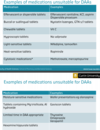Professional Pharmacy Services (Module 7) Flashcards
What fee do community pharmacies receive for participating in the DAA program?
From 1 july 2017, pharmacies participating in the DAA program will receive a fee of $6 per patient per week as a contribution towards the cost of providing the service
What is the definition for DAA?
Anything that helps to ensure a patient is both able to administer and remembers to administer their dose of medication
> Tamper-evident, adherence device developed to assist medicine management for consumer by having medicines divided into individual doses and arranged according to a dose scheduled throughout he day
What are the types of DAA?
Blister pack
- Webster pak (unit or multidose), medico pack, perso pak, venalink
ADPS - Sachets
Dosette Boxes (patients do it themselves)
What is a DAA profile? What does it include?
Document which sets out information relating to consumer (age, co-morbidities, allergies) and current medication regime
Also includes
- Community or facility patient
- Behaviour
- Physical Constraints
- GP Requests
- Type of DAA and packing interval
- Verification that regime checked as suited for DAA
- Record of changes
- Date of DAA compiled/updated
- Assessment of progress
What are multidose DAAs?
Compartmentalised boxes or blister pack type devices used to aid the administration of solid, oral medicines
What are unit dose DAA?
- Single medication per column
- Multiple medications per card
- Different colour folder for each dosage time
- Upto 4 doses per pack
What are flexi-pack DAA?
Perforated blister allows individual compartments to be separated
What is the daily pack used for?
- More active patients
- Where closer scrutiny of medications needed
What is the pill-bob device? Which patients is it used for?
Ease the removal of tablets/capsules from blister pack –> prevents spillage of blister content
Suitable for patients with
- Poor dexterity (e.g. RA)
- Poor vision
- On cytotoxic medications (avoid direct handling by patients/carers)
Those who use DAA’s often have the same number of medicines as non-DAA users, so why do they still use DAA’s?
- Live alone, have a carer and use more community care services
- Less functional with activities of daily livings
- More hospitalisations and poorer health status than usual
Who benefits the most from using DAA?
- 5+ meds
- History of MM (medication management) problems
- Complex regime
- Cognitive/physical impairment
- Recent hospital discharge
What is the DVA DAA service? How long is it prescribed by the GP for?
Provides veterans, war widows and other eligible DVA clients a DAA at no cost
- Prescribed by GP for 6 month period (assessed by pharmacist and reported to GP near end)
What are the FIVE considerations in DAA supply? Provide an example of each consideration.
Organisational factors
- Selecting a DAA system
Pharmaceutical factors
- Drug stability
Clinical factors
- Do not pack PRN meds with regular meds in same blister compartment
Patient factors
- Healths tatus and carer role
- Social situation (home or RCF based)
Economic viability
What are the examples of medications unsuitable for DAAs due to stability issues?
See image

For Staged supply;
A) What is the number of eligible patients per pharmacy?
B) Does a patient have to be referred by a prescriber?
C) Wha are examples of medicines that may be prescribed as a pharmaceutical benefit?
D) What is it?
E) What situations is it useful in
A)
- Up to four eligible patients per pharmacy
B)
Yes
C)
- opioid analgesics
- antipyschotics
- anixolytics
- hypnotics and sedatives
- anti-depressants
- psycho-stimulants
D)
The pharmacist will dispense and supply medicines to the consumer in installments
- Can be initiated by the prescriber and other healthcare professionals, the consumer (to get funding under 6CPA –> has to be initiated by prescribers
E)
- Have difficulty remembering to take medicines
- Are taking a medicine which may accidentally or deliberately be misused or over-used and cause harm
- Taking a medicine where there is a risk of misuse, abuse or diversion
- Or are confused about when how they should be taking their medications
What is continued dispensing?
Supply of an eligible medicine to consumer under the PBS when there is an immediate need for that medicine but it is not practicable to obtain a prescription, provided;
> medication has been previously prescribed, therapy is stable, prior clinical review by prescriber that supports the continuation of the medicine
> medicine safe and appropriate for the consumer
What is the eligibility criteria for continued dispensing?
- Immediate need to supply medicine to facilitate continuity of therapy
- Not practical/practicable to obtain prescription or telephone order from patients prescriber
- Most recent consultation between patient and prescriber was less than 12 months ago
- Continuation of the medicine is supported by prior clinical review and therapy is stable
- Patient has not had a continued dispensing supply of medicines in the previous 12 months
What are the medicines currently eligible for supply by continued dispensing?
- hmG-Coa reductase inhibitors (statins) –> treatment of patients with hypercholesterolemia
- Oral contraceptives
What must a pharmacist do for continued dispensing?
- Inform the most recent prescriber in writing within 24 hours that the medicine has been supplied
- Record the supply of medicines as continued dispensing supply in their pharmacy dispensing systems


